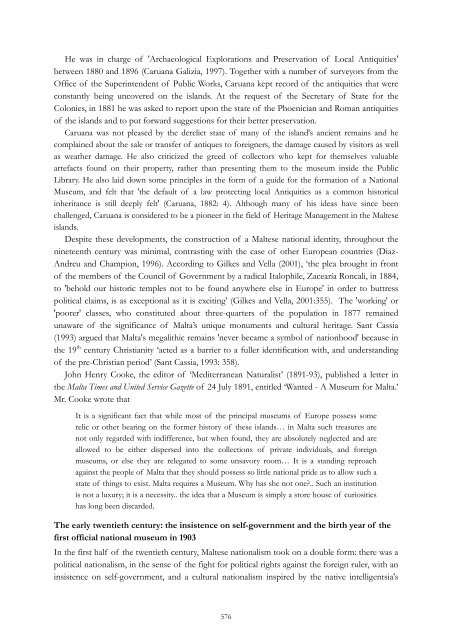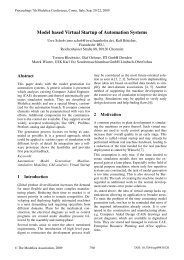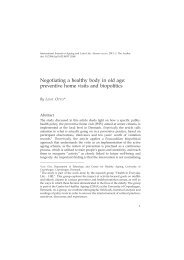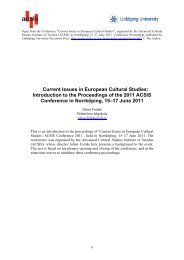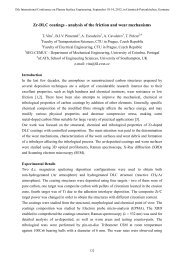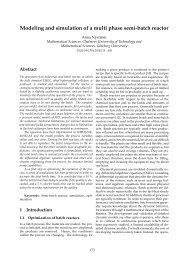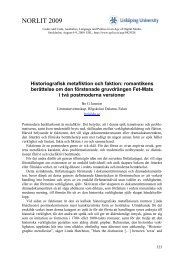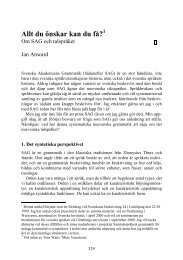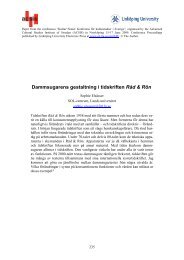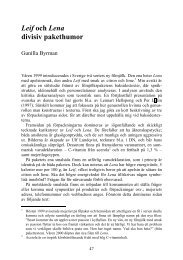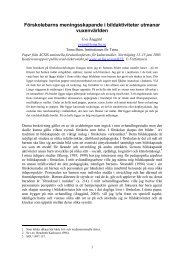Fulltext - Linköping University Electronic Press
Fulltext - Linköping University Electronic Press
Fulltext - Linköping University Electronic Press
You also want an ePaper? Increase the reach of your titles
YUMPU automatically turns print PDFs into web optimized ePapers that Google loves.
He was in charge of 'Archaeological Explorations and Preservation of Local Antiquities'<br />
between 1880 and 1896 (Caruana Galizia, 1997). Together with a number of surveyors from the<br />
Office of the Superintendent of Public Works, Caruana kept record of the antiquities that were<br />
constantly being uncovered on the islands. At the request of the Secretary of State for the<br />
Colonies, in 1881 he was asked to report upon the state of the Phoenician and Roman antiquities<br />
of the islands and to put forward suggestions for their better preservation.<br />
Caruana was not pleased by the derelict state of many of the island's ancient remains and he<br />
complained about the sale or transfer of antiques to foreigners, the damage caused by visitors as well<br />
as weather damage. He also criticized the greed of collectors who kept for themselves valuable<br />
artefacts found on their property, rather than presenting them to the museum inside the Public<br />
Library. He also laid down some principles in the form of a guide for the formation of a National<br />
Museum, and felt that 'the default of a law protecting local Antiquities as a common historical<br />
inheritance is still deeply felt' (Caruana, 1882: 4). Although many of his ideas have since been<br />
challenged, Caruana is considered to be a pioneer in the field of Heritage Management in the Maltese<br />
islands.<br />
Despite these developments, the construction of a Maltese national identity, throughout the<br />
nineteenth century was minimal, contrasting with the case of other European countries (Diaz-<br />
Andreu and Champion, 1996). According to Gilkes and Vella (2001), ‘the plea brought in front<br />
of the members of the Council of Government by a radical Italophile, Zacearía Roncali, in 1884,<br />
to 'behold our historic temples not to be found anywhere else in Europe' in order to buttress<br />
political claims, is as exceptional as it is exciting’ (Gilkes and Vella, 2001:355). The 'working' or<br />
'poorer' classes, who constituted about three-quarters of the population in 1877 remained<br />
unaware of the significance of Malta’s unique monuments and cultural heritage. Sant Cassia<br />
(1993) argued that Malta's megalithic remains 'never became a symbol of nationhood' because in<br />
the 19 th century Christianity ‘acted as a barrier to a fuller identification with, and understanding<br />
of the pre-Christian period’ (Sant Cassia, 1993: 358).<br />
John Henry Cooke, the editor of ‘Mediterranean Naturalist’ (1891-93), published a letter in<br />
the Malta Times and United Service Gazette of 24 July 1891, entitled ‘Wanted - A Museum for Malta.’<br />
Mr. Cooke wrote that<br />
It is a significant fact that while most of the principal museums of Europe possess some<br />
relic or other bearing on the former history of these islands… in Malta such treasures are<br />
not only regarded with indifference, but when found, they are absolutely neglected and are<br />
allowed to be either dispersed into the collections of private individuals, and foreign<br />
museums, or else they are relegated to some unsavory room… It is a standing reproach<br />
against the people of Malta that they should possess so little national pride as to allow such a<br />
state of things to exist. Malta requires a Museum. Why has she not one?.. Such an institution<br />
is not a luxury; it is a necessity.. the idea that a Museum is simply a store house of curiosities<br />
has long been discarded.<br />
The early twentieth century: the insistence on self-government and the birth year of the<br />
first official national museum in 1903<br />
In the first half of the twentieth century, Maltese nationalism took on a double form: there was a<br />
political nationalism, in the sense of the fight for political rights against the foreign ruler, with an<br />
insistence on self-government, and a cultural nationalism inspired by the native intelligentsia's<br />
576


